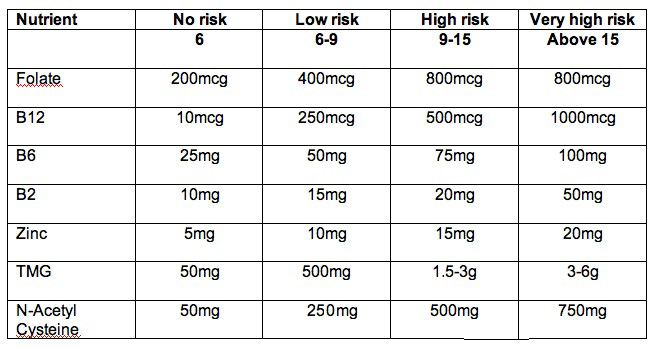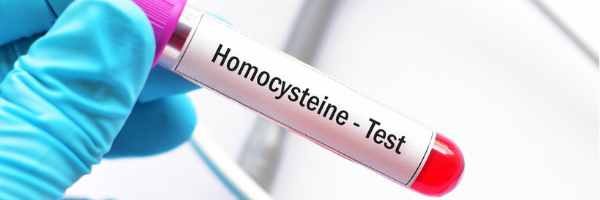How to measure your homocysteineHomocysteine is an amino acid found in the blood. Elevated levels of homocysteine have been associated with narrowing and hardening of the arteries, an increased… level. Homocysteine is measured in micromoles per litre, written as µmol/l. We used to think a ‘high’ level was above 15 units (µmol/l). This is what increases your risk of a heart attack and doubles your Alzheimer’s risk. Now, however, levels as low as 7 units are being linked to increased disease risk. Basically, there’s no official safe level and no guarantee that the diet and supplements you are currently taking are keeping homocysteine at bay. Up to 30% of people with a history of heart disease have a homocysteine level above 14 units. The average level in Britain is 10.5.
Research on dementia at Oxford University finds that a level above 11.5 is an indicator of accelerated brain shrinkage, so you certainly want your homocysteine level below that. However, experts believe that a level below 6 units is ideal. If you have any of the associated risk factors listed in the two checklists below, it’s especially important to get tested.
Since homocysteine does go up with age, if you are pursuing optimal health and aiming to minimise risk of developing any disease, including Alzheimer’s, my rule of thumb is to keep your ‘H’ score below your age, divided by ten. So, if you are 80, keep your level below 8. The H signs and symptoms – check yourself out
If you have five or more of these symptoms, it’s almost a certainty that your homocysteine is moderate to very high (9 to 15, if not higher): Are you tired a lot of the time? Is your stamina, or ability to keep going, noticeably decreasing? Are you having a hard time keeping your weight stable? Do you often experience physical pain, be it arthritis, muscle aches or migraines? Do you get frequent colds? Is your eyesight deteriorating? Is your mental clarity or concentration decreasing? Are you experiencing more sleeping problems? Is your memory on the decline? Are you often depressed? Do you average two or more alcoholic beverages daily? Do you drink more than three cups of coffee daily? Do you smoke cigarettes? Are you a strict vegetarian? Do you eat red meat at least once a day? Has your first-degree family (mother, father, brothers or sisters) suffered from any of the following:
• Heart disease, especially before 50 years of age
• Strokes
• Alzheimer’s disease
• Abnormal blood clots
• Osteoporosis
• Cancer, especially myelomas
• Severe depression (especially in women)
• Elevated homocysteine levels
How to reduce a high level of homocysteine
The current vogue in medicine is to recommend taking folic acidWhat it does: Critical during pregnancy for the development of a baby’s brain and nerves. Also essential for brain and nerve function. Needed for utilising…. Described in the British Medical Journal as ‘the leading contender for panacea of the 21st century’, folic acid alone is far less effective than the right nutrients in combination. The amount you need also depends on your current homocysteine level. One study found homocysteine scores were reduced by 17% on high-dose folic acid alone, 19% on vitamin B12 alone, 57% on folic acid plus B12, and 60% on folic acid, B12 and B6.[1] All this was achieved in three weeks! However, even better results would have been achieved by including TMG. This is the best methyl donor to supplement. This is because only it can immediately donate a methyl group to homocysteine, thus detoxifying it.
In one New Zealand study, the homocysteine scores of patients with chronic kidney failure and very high homocysteine levels were reduced by a further 18% when 4g of TMG was given, along with 50mg of vitamin B6 and 5000mcg of folate, compared to patients taking just B6 and folate.[2] At the Brain Bio Centre we achieve, on average, reductions in high homocysteine scores of greater than 50% in eight to twelve weeks with the combination of these nutrients, plus diet! Some companies produce combinations of these nutrients. These are the most cost-effective supplements for restoring a healthy homocysteine level. The inclusion of N-acetyl cysteine is particularly important in older people when memory protection is the aim. This is because this vital antioxidantAntioxidants are substances that protect cells within the body from damage caused by free radicals. They help to strengthen the body’s ability to fight infection… helps the methylationMethylation is what occurs when the body takes one substance and turns it into another, so that it can be detoxified and excreted from the… B vitamins to protect brain function.
Case study: lowering homocysteine ‘saved my life’ Chris K felt very unwell, with constant tiredness, worsening memory and concentration and little zest for life. He was depressed, had no sex drive and felt brain dead. His homocysteine score was 119. He changed his diet and took homocysteine-lowering nutrients and, within three months, his homocysteine level dropped to 19. After 6 months it had dropped to 11. He cannot believe how well he now feels. His memory and concentration are completely restored. He has boundless energy from 6am until 10pm He now exercises for an hour every day and has lost weight. “You have saved my life, or at least made it worth living again. I’m a new man and my love life has perked up,” says Chris, who followed the supplement and dietary guidelines in The H Factor. Nutrients and levels to supplement, depending on your homocysteine score 
Note: the most functional form of folate is called MTHF. This is twice as effective. Supplements that use this need half the dose of folic acid given above. I also prefer the methylated form of B12 – methylcobalamine.
Follow my H Factor diet A few years ago, I devised the H Factor diet – eight easy dietary changes that will help to lower your homocysteine level.
Here they are:
1. Eat less fatty meat, more fish and vegetable proteinProteins are large molecules consisting of chains of amino acids. Proteins are essential nutrients for the human body – they are a building block of… Eat no more than four servings of lean meat a week; fish (not fried) at least three times a week; and if you’re not allergic or intolerant, a serving of a soya-based food, such as tofu, tempeh or soya sausages, plus beans, such as kidney beans, chickpea hummus or baked beans, at least five times a week.
2. Eat your greens Have at least five servings of fruit or vegetables a day. This means eating two pieces of fruit every single day, and three servings of vegetables. Vary your selections from day to day. Make sure half of what’s on your plate for each main meal is vegetables.
3. Have a clove of garlic a day Either eat a clove of garlic a day, or take a garlic supplement every day. You can take garlic oil capsules or powdered garlic supplements.
4. Cut back on tea and coffee Don’t drink more than one cup of caffeinated or decaffeinated coffee or two cups of tea, in a day. Instead choose from the wide variety of herbal teas and grain coffees available.
5. Limit your alcohol Limit your alcohol intake to no more than half a pint of beer, or one glass of red wine, in a day. Ideally, limit your intake to two pints of beer or four glasses of wine a week.
6. Reduce your stress If you are under a lot of stress, or find yourself reacting stressfully much of the time, make a decision to reduce your stress load by changing both the circumstances that are giving you stress and your attitude. Simple solutions abound: you can do yoga, meditation and/or exercise, or see a counsellor if you have some issues to resolve. These steps can make all the difference.
7. Stop smoking If you smoke, make a decision to stop, and seek help to do it. There is simply no safe level of smoking as far as homocysteine and your health is concerned. Smoking is nothing less than slow suicide. The sooner you stop the longer you’ll live. Refer to my How to Quit book for support if you need it.
8. Supplement a high-strength multivitamin every day. Excellent-quality multis are available in every health food store and some supermarkets, or visit HOLFORDirect online. To keep your homocysteine levels in check, you’ll need one that gives at least 20mg of B6, 200mcg of folic acid and 10mcg of B12. This diet, lifestyle and supplement plan has the potential to halve your homocysteine score in weeks. If it’s high, then you may need to supplement additional nutrients, as outlined in the table above. The goal is to bring your score to below 6 or 7 if you are over 50. Your homocysteine score is probably the best objective measure of whether you are achieving optimum nutrition for you.
Summary: Keeping your homocysteine levels low
• Test your homocysteine level.
• If it’s above 6, supplement the levels of homocysteine-lowering nutrients given in the table above.
• Also take a high-strength multi-vitamin giving at least 20mg of B6, 200mcg of folic acid and 10mcg of B12, even if your H score isn’t above 6.
• Follow the H Factor plan as shown above.
• Re-test yourself every three months until your homocysteine is below 6.
Then test yourself once a year. Dig deeper by reading my book, co-authored with Dr James Braly, The H Factor. The book Ten Secrets of 100% Healthy People also has a whole chapter on homocysteine and methylation.
Get Your Homocysteine Tested
There is good reason to test homocysteine in those with either cardiovascular, cerebrovascular or cognitive concerns. It should be a routine test for pregnancy and vegans with any health issues but it isn’t.
For any homocysteine test which is done, in the clear part (the plasma) of the blood, the sample must either be:
(a) Separated – spun or put through a plasma separator – on taking or
(b) Preserved by using a container tube preloaded with the preservative, then sent to the lab.
Your doctor can request a homocysteine test. As of September 2022, you can also get your homocysteine tested at:
Genova Diagnostics (+44 (0)20 8336 7750). They send a kit out but you will need a practitioner to take the blood.
To use some companies who offer the tests you need a referral from a practitioner. Find your nearest nutritional therapist at www.bant.org.uk.
Medichecks offer a home test kit for homocysteine – https://medichecks.com/products/homocysteine-blood-test. Also try Drs Lab.
Functional DX require a nutritional therapist and phlebotomist appointment at clinic or home. They do Individual tests, multiple biomarker tests that include homocysteine, brain checks that include homocysteine and a comprehensive Alzheimer’s Profile.
Get Your Memory Tested
Take the Cognitive Function test
Further Support
HOLFORDirect provides formulations to support brain health such as Brain Food, Connect and Essential Omegas.


Comments
Join the Conversation on our Facebook Page